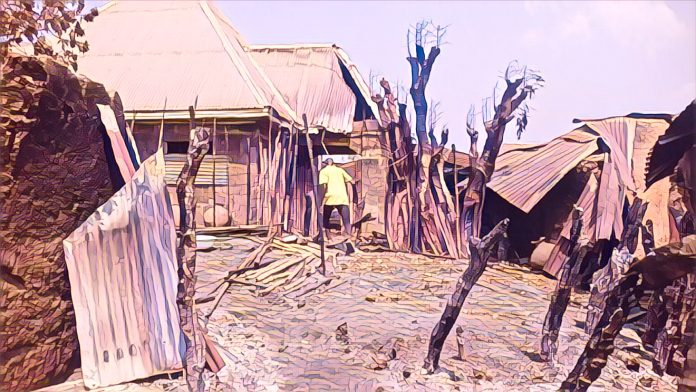KEY POINTS
- Armed herdsmen now control 44 farming settlements across five autonomous communities in Eha-Amufu, displacing thousands since 2020.
- Despite over 180 deaths and mass kidnappings, security forces and the Enugu State government have failed to restore order or investigate crimes.
- Residents accuse occupiers of destroying crops, occupying schools/churches, and inviting reinforcements from Benue border communities.
For over two decades, residents of Eha-Amufu in Isi-Uzo Local Government Area of Enugu State have lived under the shadow of violence as armed herdsmen systematically overrun their farmlands and homes.
What began as isolated clashes in 2002 has escalated into full-scale occupation, with at least 44 farming settlements now controlled by herdsmen.
The latest herdsmen attack occurred on February 28, 2025, when Ndiagu Amofia village—one of the last remaining holdouts—was sacked, forcing residents to flee to neighboring towns. “All the farm settlements in our community, nobody goes there. If you dare, it is either you are killed or kidnapped for ransom,” said Chigbo Okibe, a displaced resident.
A pattern of displacement and impunity by the herdsmen
The investigations paint a harrowing picture of systematic displacement and unchecked violence.
Across Eha-Amufu, the once-thriving farm settlements now lie in ruins, their original inhabitants scattered while armed herders occupy the land with impunity. In Abor Ishala, nine settlements—including Ogomungo and Ngele-Akpankpa—have been seized, their homes emptied and fields left untended.
Agu-Amede has suffered a similar fate, with Okpokwu and eight other villages falling under the control of occupiers. The devastation is even more pronounced in Mgbuji, where 18 communities have been completely emptied, their abandoned homes now repurposed by herders. Eha-Agu, though smaller in scale, has not been spared, with three settlements razed and valuable palm plantations destroyed, stripping residents of both shelter and livelihood.
“The Fulani people are planning to take over the entire Eha-Amufu,” warned Mrs. Chinyere Odoebe, gesturing toward the skeletal remains of homesteads where families were once massacred. Her voice trembled with frustration as she added, “Security agents only surface to carry corpses after attacks.”
The authorities’ response—or lack thereof—has only deepened the crisis. Despite a temporary military deployment in 2023, the state government has failed to reclaim the occupied territories or provide lasting security.
A much-touted road project in Mgbuji, intended to improve access for security forces, stalled without explanation, leaving communities even more vulnerable. Police, meanwhile, reportedly avoid patrolling the contested areas, leaving villagers at the mercy of the armed occupiers. “We reported two missing persons to the State CID, but nothing was done,” revealed Mrs. Angela Ogenyi, her words heavy with resignation. She noted that since 2020, over 180 deaths have been documented—yet no one has been held accountable.
The economic toll has been catastrophic. With farmlands seized or destroyed, hunger has become a grim reality for displaced families. “Hunger is killing people,” Ogenyi said, her voice breaking. “They destroy our cassava, yams, and rice—then accuse us of killing cows when we protest.” The cruel irony is not lost on the survivors: those who once fed their communities now rely on handouts from relatives in distant cities, while their ancestral lands slip further from their grasp. Without urgent intervention, the cycle of displacement and impunity shows no sign of ending.



